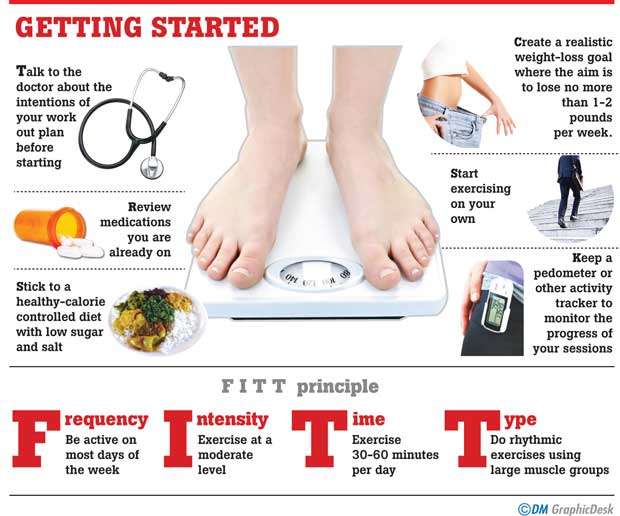Reply To:
Name - Reply Comment

 Hitting the gym daily and following a strict dietary plan might still not help you achieve your desired health goals and leave you frustrated. This is despite you engaging in this aspect of your life wholeheartedly. This week on Health Capsule we are discussing the subject of healthy weight loss through effective exercises plus diet and how it can be attributed to a healthy lifestyle; which leaves disease-free.
Hitting the gym daily and following a strict dietary plan might still not help you achieve your desired health goals and leave you frustrated. This is despite you engaging in this aspect of your life wholeheartedly. This week on Health Capsule we are discussing the subject of healthy weight loss through effective exercises plus diet and how it can be attributed to a healthy lifestyle; which leaves disease-free.
To shed light on this important topic we had a discussion with Dr. Upul Madahapola, Registrar Sports and Exercise Medicine, Teaching Hospital, Kandy.
“The incidence of obesity and being over-weight have rapidly increased over the past twenty years with rising co-morbidities including Type 2 Diabetes, heart diseases, high blood pressure and stroke as a result of unacceptable unhealthy lifestyles led by people. Such people try to achieve temporary pleasure without thinking of long-term consequences. At certain points in life, we do tend to come to our senses and practice healthy habits, dietary control and do exercises in order to achieve a healthy body. However, the results can be purely dissatisfying due to the ways we choose to carry out such practices. This is what we as health care professionals try to create awareness on. If the right quota of physical exercise and diet can be identified and customized according to the individual’s requirements, all of us would be able to gain the most of what we crave for, without any unnecessary hardships,” explains Dr. Madahapola.
Dr. Madahapola has much to say about how much exercise an individual needs. According to him it is a question we usually come across in our daily life. Most of the effective results are achieved when you can make exercises a regular part of your life. The key is to engage in sweat-shedding activities which you really enjoy so that both your mind and body will benefit from it-thus leading us to the desired goals. Evidence suggests that both aerobic exercises and muscle- strengthening activities play a vital role in healthy weight loss. Resistance work-out can also be added to this as time passes when you are properly adopted to a higher basal metabolic rate.
Kick- starting your routine


Aerobic Exercise Programs
 “According to the American College of Sports Medicine, the key to losing weight is to add up the amount of exercise you tend to carry out daily. The energy used to walk a certain distance is more or less the same whether you walk fast or slow. Putting it in a simple way, it’s the same amount of calories you burn no matter what the pace is as long as the energy consumed is balanced by the walking distance. If you are someone who gets tired quickly, the best way to practice is slow pace walking with a comparatively longer distance” Dr. Madahapola underscores.
“According to the American College of Sports Medicine, the key to losing weight is to add up the amount of exercise you tend to carry out daily. The energy used to walk a certain distance is more or less the same whether you walk fast or slow. Putting it in a simple way, it’s the same amount of calories you burn no matter what the pace is as long as the energy consumed is balanced by the walking distance. If you are someone who gets tired quickly, the best way to practice is slow pace walking with a comparatively longer distance” Dr. Madahapola underscores.
Frequency- Be active on most days of the week (at least 3-4 days).
Intensity – Exercise at a moderate level. ‘Talk test’ will help you to monitor this. For example, even if there is a small rise in your heart and breathe rate, you should be able to carry on a conversation while walking at this recommended moderate pace. Vigorous exercise causes more increase in heart rate and breathing which will actually create no benefit in the long run-as you get fed up and break the regularity.\
Time – Exercise 30-60 minutes per day. You can do it all at once or break it up into a few sessions of at least 10 minutes each.
Type – Do rhythmic exercises using large muscle groups. Brisk walking, cycling and swimming are ideal when it comes to healthy weight loss. Choose a variety of activities you enjoy so that you tend to engage in them regularly.
Tips
Resistance exercise programs
If you try to lose weight in an unhealthy way both your fat and muscles will be gone in no time resulting in an ill-looking cachectic appearance. Moderate-intensity resistance training is the best way to increase your muscle mass while shedding fat and can be practiced at home with light weight lifting, push-ups and sit-ups. Do not continue to lift weights when you feel exhausted and avoid holding your breath when lifting-up.
“Once you are adhered to a weight loss programme for 6 months, a weight-maintenance programme can be continued with there onwards with increased physical activity, weight monitoring and a reduced intake of calories which will then become your healthy routine lifestyle. However, it is extremely important to weigh the risks versus benefits when it comes to exercise programmes in individuals with co-morbidities and always remember to seek medical advice in order to avoid unnecessary out-turns” concluded
Dr. Madahapola.